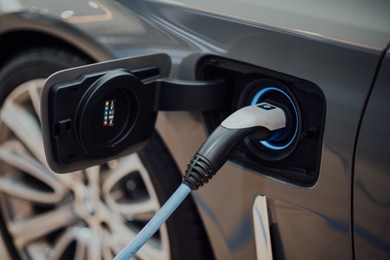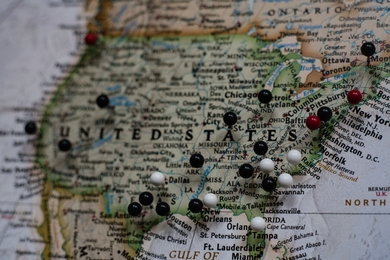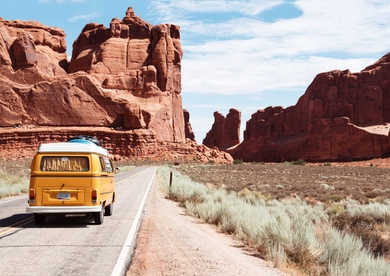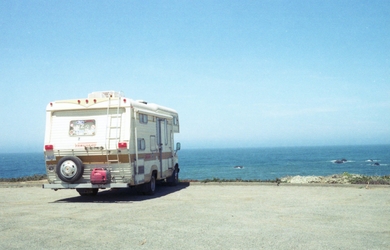The Best RV Insurance Companies: Compare Lowest Rates | Gabi

Table of Contents
- Best RV Insurance Companies by Category
- How to choose the best RV insurance policy
- RV Insurance classes, and how they impact insurance prices
- Best RV Insurance: FAQs
Whether your recreational vehicle (RV) is your full-time home or you mostly use it for vacations, RV insurance is a must-have for motorhome owners. Just as car owners need auto insurance for roadside assistance, liability coverage, and emergency expenses, RV owners also feel peace of mind when they have insurance coverage for unexpected situations.
RV insurance is a category of specialized insurance products, so insurance providers may offer different types of RV and travel trailer insurance. Compare RV insurance to get the lowest rates with recommendations from Gabi experts.
Best RV Insurance: Compare Companies by Category
Best Overall: Nationwide
A household name when it comes to insurance of all kinds, Nationwide has earned a strong reputation in RV insurance coverage as well as travel trailer insurance. They customize their product via a variety of discounts, for example when you bundle your RV insurance with other policies or when you have multiple vehicles on one policy.
They also find other ways to give you the best rate, including discounts for taking a safety course or becoming a member of a qualified RV organization. They get an A+ accreditation on the Better Business Bureau website, and they offer $10,000 in vacation liability coverage and options to make your policy cover replacement costs rather than just the assessed value at the time of the incident.
Best Customization Options: National General
While every insurer has areas where they stand out, National General shines because of their available discounts and the options they provide for both part- and full-time owners of recreational vehicles. Getting an RV insurance quote from National General is easy and informative, and they have great options to address specific needs.
For example, they recognize that pop-up trailers, fifth-wheel trailers, and different classes of RVs all need coverage, but you might not need the add-on for personal belongings, or you might want to reduce your coverage or suspend it when you aren’t planning to be using your RV for a while. They also recognize that driving with an RV can be tricky, so they reward drivers who learn the ropes in an RV driving class. Overall, exploring their options is worth the time, since you might discover coverage you didn’t even know about — like inspections after your RV has a repair or search assistance if your RV is stolen.
Best Bundling Potential: Progressive
Progressive has a reputation for excellence, with strong ratings on major consumer evaluation websites for everything from renters insurance to life insurance. Their breadth of coverage and bundling discounts make it easy and cost-effective to cover all of your needs — for example, bundling your RV coverage with an auto policy, boat policy, and homeowners insurance. According to their website, the average bundling discount is in the range of 4%, and other discounts may apply.
Best RV Insurance for Full-Timers: Farmers
When you live in an RV full time, you need your insurance to have coverages that might be more common in a homeowners insurance policy. After all, if there’s an accident or other RV issue, you’re left without a home.
Farmers Insurance delivers high-quality service and they receive strong full-time RV insurance reviews. You can add total loss replacement to your policy so you know you can get an equivalent RV in the event of a catastrophe. Other coverages may seem like small things, like towing and roadside assistance, but when you’re standing next to your vehicle in a tough spot, you’ll be glad you took advantage of the options that Farmers offers.
Best Value for Weekend Tourists: Safeco
If you use your RV for less than two-thirds of the year (250 days or fewer), Safeco’s products are a great option. Since you already have a primary residence, you don’t want to pay for coverage that is more comprehensive than you need. Safeco offers a variety of optional coverages including loan protection, personal effects, and 24-hour roadside assistance. You can keep or remove each one, depending on whether they make sense for your part-time RV situation.
How to choose the best RV insurance policy
While these and many other RV insurance companies can be great options for RVers, everyone’s insurance needs are different. Only you know what coverages will be most valuable to you, and your best RV insurance rates will reflect your particular mix of coverages.
For instance, if you have a very new trailer or still have a large loan on your RV, you might want additional coverage above the required liability levels. Even when your RV is older, it’s a good idea to consider total loss replacement, comprehensive coverage, and collision coverage. Think about paying the full replacement cost yourself in the event of a major wreck, and you’ll see why many motorists prefer to purchase replacement cost coverage and other higher-limit policy features.
RV Insurance classes, and how they impact insurance prices
There are three classes of motorhomes, along with a variety of sizes of travel trailers. The three classes are all drive-on-their-own vehicles, but even a very large fifth-wheel trailer must be towed behind a truck.
Class A motorhomes are shaped like and built on the structure of a bus – these will typically have the highest insurance rates in many cases because they are also the most expensive and largest of the motorhomes.
Class B recreational vehicles are smaller and built like a van, and as such are often called “camper vans” or “sleeper vans.” Surprisingly, they usually have the lowest insurance rates of the three classes, despite being the middle letter. That’s because Class B RVs have been determined to pose lower risks in some respects.
Class C recreational vehicles are the middle-sized option, built with a truck-style cab connected to a living space that is in between the luxury of Class A and the compact style of Class B. As a result, Class C insurance rates tend to fall in between rate ranges for the other two.
Best RV Insurance: FAQs
What is RV insurance?
Recreational vehicle insurance is a specialized policy that covers a Class A, B, or C recreational vehicle, offering coverages not included in your auto policy. It can also include more robust personal property and personal effects coverage, more like homeowners insurance, since many people use an RV as their home.
What’s typically covered by RV insurance?
RV insurance often includes coverages like vacation liability coverage, personal injury protection, personal belongings protection, medical payments coverage, and personal liability coverage. You’re likely to see many of the coverages that you’d find on a homeowners policy or auto policy, along with some other insurance options specific to RVs.
What’s typically excluded from RV insurance?
The fine print on any given RV insurance policy may contain limitations, restrictions, and exclusions, so you’ll want to read carefully. A good example is that there may be exclusions for wear and tear on a vehicle that is parked outdoors due to an animal or other pests sneaking into and damaging the motorhome. RV insurance also typically excludes travel trailers, which require a separate policy.
What are the best practices for making an RV claim?
Making a motorhome and towable trailer claim is a fairly similar process to an auto insurance claim. Start by taking pictures at the scene, with as many close-up, detailed photos as possible. If another motorist was involved, get their insurance information and obtain a police report, if applicable. When you have relevant expenses, such as hotel stays due to loss of use coverage, keep the receipts. Finally, keep an eye on whether the bills are likely to be substantially higher than your deductible, since some policies reward you for not filing a claim — it may be worthwhile to pay out of pocket for smaller repairs.
What is the best RV insurance company?
We’ve found that Nationwide and the other companies listed above offer excellent coverages, compelling discounts, transparent insurance quotes, and great customer service.
Who has the most affordable RV insurance?
While many companies offer competitive prices, GEICO often comes in with very low premiums for insurance costs. Remember, however, that the cheapest motorhome insurance companies may not provide the exact coverage options you’re looking for.
How much does RV insurance typically cost?
While $1000 to $2000 is a typical range for a full-time RVer’s annual premium, the class of your vehicle, state where you have insurance, and types of coverage you request will impact that range.









